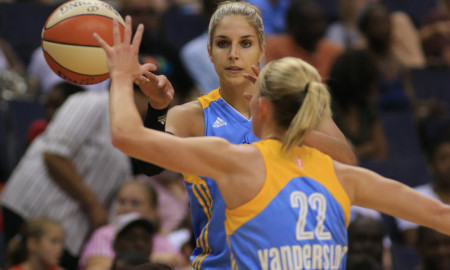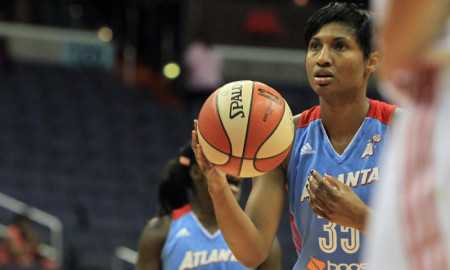On Wednesday, the WNBA announced that its president, Laurel J. Richie, would be resigning. NBA Deputy Commissioner Mark Tatum will assume the role of interim president as the search for her successor begins.
Hailed as a sharp businesswoman, Richie replaced Donna Orender as WNBA President at the start of the 2011 season. Under her watch, the league enjoyed more stability than in years past: the recent relocation of the Shock franchise to Dallas was the only instance of a WNBA team moving since Richie took over, and no teams folded during her tenure. This is significant when you consider that the league had previously lost four years’ worth of championships when the Houston Comets and Sacramento Monarchs folded in 2008 and 2009, respectively. Fans will recall that while the Los Angeles Sparks came close in 2014, they were saved by a new ownership group featuring former Lakers great Magic Johnson.
The WNBA hit several other security and financial milestones under Richie, most notably the huge extension of its partnership with ESPN in 2013, which will continue through 2025 and ensure that the league has a home on national television. The WNBA also smoothly entered into a Collective Bargaining Agreement the following year, ensuring stability on that front for eight more seasons. Perhaps most importantly, the league finally embraced its LGBT following in 2014, as the WNBA’s Pride campaign became the first of its kind in any professional sports league. This niche carved by Richie will undoubtedly help the WNBA continue to forge its identity.
Despite the overall stability of the WNBA during Richie’s time as president, there were still plenty of concerns. Many of such concerns reached a peak in 2015, when several marquee players either sat out large portions of the season or didn’t show up entirely. Frustrations about the league’s officiating not being able to keep up with its talent level continue to grow among fans, players and coaches alike. And while there’s no denying that the WNBA as a whole is more talented than it was when Richie took over, whether or not the part of her legacy concerning the league’s on-court product will be positive is anyone’s guess.
Then there were the comments made by NBA Commissioner Adam Silver in September. Silver expressed his disappointment in the league’s progress, saying that “It’s not where we hoped it would be…we thought ratings and attendance would be higher.”
While not too many fans were happy with Silver’s assessment of the WNBA at the time, the numbers don’t lie: according to SportsBusiness Daily, the WNBA’s average attendance in 2015 was 7,318 fans per game, which is the lowest mark in the league’s 19-year history. As for ratings, it’s hard to grow the visibility of any sports league when it isn’t on TV. In spite of its massive partnership with ESPN, the WNBA had only 11 of its regular-season games featured on the network.
It’s true that there likely wasn’t much Richie could have done about this, and she fulfilled her role as a business-savvy leader. Still, this is a critical period for the WNBA, as it will be searching for its first president since David Stern’s resignation from his NBA duties. One must remember that the WNBA likely wouldn’t exist if it weren’t for Stern, and his successor Silver’s comments about the league still have many fans on edge. Ideas are already flying around on social media as to who Richie’s replacement should be, but what’s certain is that whoever accepts the role must build on what Richie started while continuing to guide the WNBA to a rightful spot as one of the most visible sports leagues in America.
-
James DeShields

